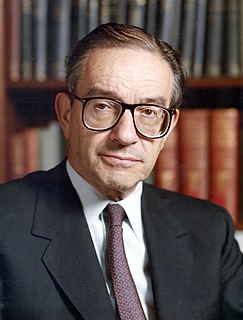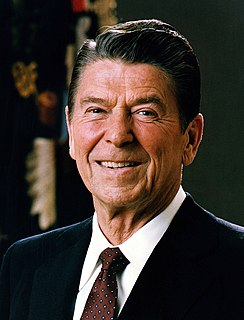Related Research Articles

In the United States, Social Security is the commonly used term for the federal Old-Age, Survivors, and Disability Insurance (OASDI) program and is administered by the Social Security Administration. The original Social Security Act was enacted in 1935, and the current version of the Act, as amended, encompasses several social welfare and social insurance programs.

Alan Greenspan is an American economist who served as the 13th chair of the Federal Reserve from 1987 to 2006. He works as a private adviser and provides consulting for firms through his company, Greenspan Associates LLC.
The Glass–Steagall legislation describes four provisions of the United States Banking Act of 1933 separating commercial and investment banking. The article 1933 Banking Act describes the entire law, including the legislative history of the provisions covered herein.

The Federal Old-Age and Survivors Insurance Trust Fund and Federal Disability Insurance Trust Fund are trust funds that provide for payment of Social Security benefits administered by the United States Social Security Administration.
Upper class in modern societies is the social class composed of people who hold the highest social status, usually are the wealthiest members of class society, and wield the greatest political power. According to this view, the upper class is generally distinguished by immense wealth which is passed on from generation to generation. Prior to the 20th century, the emphasis was on aristocracy, which emphasized generations of inherited noble status, not just recent wealth.

Willis David Gradison Jr. is an American politician from Ohio who served in the United States House of Representatives from 1975 to 1993.

Ronald Reagan's tenure as the 40th president of the United States began with his first inauguration on January 20, 1981, and ended on January 20, 1989. Reagan, a Republican from California, took office following a landslide victory over Democratic incumbent President Jimmy Carter in the 1980 presidential election. Four years later, in the 1984 election, he defeated Democrat former vice president Walter Mondale to win re-election in a larger landslide. Reagan was succeeded by his vice president, George H. W. Bush, who won the 1988 presidential election with Reagan's support. Reagan's 1980 election resulted from a dramatic conservative shift to the right in American politics, including a loss of confidence in liberal, New Deal, and Great Society programs and priorities that had dominated the national agenda since the 1930s.
This article concerns proposals to change the Social Security system in the United States. Social Security is a social insurance program officially called "Old-age, Survivors, and Disability Insurance" (OASDI), in reference to its three components. It is primarily funded through a dedicated payroll tax. During 2015, total benefits of $897 billion were paid out versus $920 billion in income, a $23 billion annual surplus. Excluding interest of $93 billion, the program had a cash deficit of $70 billion. Social Security represents approximately 40% of the income of the elderly, with 53% of married couples and 74% of unmarried persons receiving 50% or more of their income from the program. An estimated 169 million people paid into the program and 60 million received benefits in 2015, roughly 2.82 workers per beneficiary. Reform proposals continue to circulate with some urgency, due to a long-term funding challenge faced by the program as the ratio of workers to beneficiaries falls, driven by the aging of the baby-boom generation, expected continuing low birth rate, and increasing life expectancy. Program payouts began exceeding cash program revenues in 2011; this shortfall is expected to continue indefinitely under current law.
Greenspan is a typically Ashkenazi Jewish surname. It is the anglicized form of the German/Yiddish surname Grünspan. Cognate are the surnames Grynszpan and Grinshpan.

Sociology of terrorism is a field of sociology that seeks to understand terrorism as a social phenomenon. The field defines terrorism, studies why it occurs and evaluates its impacts on society. The sociology of terrorism draws from the fields of political science, history, economics and psychology. The sociology of terrorism differs from critical terrorism studies, emphasizing the social conditions that enable terrorism. It also studies how individuals as well as states respond to such events.

Laurence Jacob Kotlikoff is a Professor of Economics at Boston University, a William Warren Fairfield Professor at Boston University, a Fellow of the American Academy of Arts and Sciences, a Research Associate of the National Bureau of Economic Research, a Fellow of the Econometric Society, and a former Senior Economist on the President's Council of Economic Advisers.

I.O.U.S.A. is a 2008 American documentary film directed by Patrick Creadon. The film focuses on the shape and impact of the United States national debt. The film features Robert Bixby, director of the Concord Coalition, and David Walker, the former U.S. Comptroller General, as they travel around the United States on a tour to let communities know of the potential dangers of the national debt. The tour was carried out through the Concord Coalition, and was known as the "Fiscal Wake-Up Tour."
Ronald Reagan was the 40th President of the United States (1981–1989). A Republican and former actor and governor of California, he energized the conservative movement in the United States from 1964. His basic foreign policy was to equal and surpass the Soviet Union in military strength, and put it on the road to what he called "the ash heap of history". By 1985, he began to co-operate closely with Soviet leader Mikhail Gorbachev–they even became friends–and negotiated large-scale disarmament projects. The Cold War was fading away and suddenly ended as Soviets lost control of Eastern Europe almost overnight in October 1989, nine months after Reagan was replaced in the White House by his vice president George H. W. Bush, who was following Reagan's policies. The Soviet Union itself was dissolved in December 1991. In terms of the Reagan doctrine, he promoted military, financial, and diplomatic support for anti-Communist insurgencies in Afghanistan, Nicaragua, and numerous other countries. For the most part, local communist power collapsed when the Soviet Union collapsed.
Regulatory responses to the subprime crisis addresses various actions taken by governments around the world to address the effects of the subprime mortgage crisis.
The Committee for a Responsible Federal Budget (CRFB) is a non-profit public policy organization based in Washington, D.C. that addresses federal budget and fiscal issues. It was founded in 1981 by former United States Representatives Robert Giaimo (D-CT) and Henry Bellmon (R-OK), and its board of directors includes former Members of Congress and directors of the Office of Management and Budget, the Congressional Budget Office and the Federal Reserve.
The National Commission on Fiscal Responsibility and Reform was a bipartisan Presidential Commission on deficit reduction, created in 2010 by President Barack Obama to identify "policies to improve the fiscal situation in the medium term and to achieve fiscal sustainability over the long run". The 18-member Commission consisting of 12 members of Congress and six private citizens, first met on April 27, 2010. A report was released on December 1, 2010, recommending a combination of spending cuts and tax increases.
In monetary policy of the United States, the term Fedspeak is what Alan Blinder called "a turgid dialect of English" used by Federal Reserve Board chairmen in making wordy, vague, and ambiguous statements. The strategy, which was used most prominently by Alan Greenspan, was used to prevent financial markets from overreacting to the chairman's remarks. The coinage is an intentional parallel to Newspeak of Nineteen Eighty-Four, a novel by George Orwell.
The Great Recession in the United States was a severe financial crisis combined with a deep recession. While the recession officially lasted from December 2007 to June 2009, it took many years for the economy to recover to pre-crisis levels of employment and output. This slow recovery was due in part to households and financial institutions paying off debts accumulated in the years preceding the crisis along with restrained government spending following initial stimulus efforts. It followed the bursting of the housing bubble, the housing market correction and subprime mortgage crisis.

A limited form of the Social Security program began as a measure to implement "social insurance" during the Great Depression of the 1930s, when poverty rates among senior citizens exceeded 50 percent.
There have been several efforts or appeals in the United States to reinstate repealed sections of the Glass–Steagall Act following the financial crisis of 2007-08, as well as elsewhere to adopt similar financial reforms.
References
- ↑ "Social Security History".
- ↑ "Social Security Reform Act of 1983 (1983 - H.R. 924)".
- ↑ "Alan Greenspan and the Meaning of "Trust"". www.tcf.org. Archived from the original on 8 October 2006. Retrieved 13 January 2022.